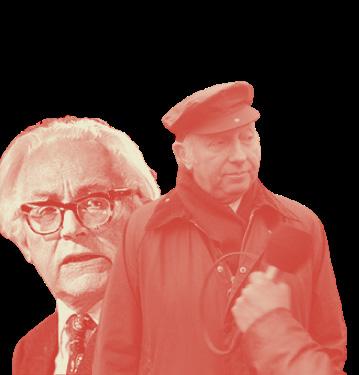
7 minute read
Dan Harrison: Labour must save the Union
Labour must save the Union Dan Harrison, History at Worcester
Labour must craft a radical devolution settlement to save the Union. Since 2010, the party’s absence from the devolution debate has enabled the political discourse to be hijacked by those on the extremes. Ed Miliband pledged to ‘reverse’ centralisation and argued devolution was a ‘good idea,’ but opposed a ‘new rung of governance.’ So who would power be devolved to? Jeremy Corbyn provided breathtaking clarity when he explained that ‘everything was on the table’ when it came to devolution. Yet the 2019 general election manifesto renewed Labour’s commitment to a centralised state focused on the redistribution of income and wealth through the creation of a national investment bank. What about the redistribution of power? In the Labour leadership election Sir Keir Starmer articulated his vision for a constitutional settlement based on ‘federalism,’ but he is yet to move beyond first principles. Why does any of this matter anyway? It matters because the citizens of this nation are being poorly served by the quality of the political debate on constitutional issues and Labour has a moral duty to provide an intellectually coherent policy. Recently, in a meeting with Conservative MPs, Boris Johnson called Scottish devolution a ‘disaster’. His policy is to devolve, distrust and dismiss. The Conservatives can’t be trusted to deliver meaningful constitutional reform when they are led by a man who once said, ‘government by a Scot is just not conceivable in the current constitutional context.’ Meanwhile, the SNP offer independ ence, which would spell economic catastrophe for Scotland. Leaving the UK would mean losing the benefits of the Barnett formula, in which it receives £1900 more per head in public spending than England. Labour must offer a new way. A constitutional settlement must be built that shares power not only with the nations of the United Kingdom, but also its regions. The situation is urgent. The most recent public poll on Scottish independence has the Yes campaign eleven points ahead. Yet disaffection also looms in Wales, with support for independence growing. A recent YouGov poll found that there had been a 10% increase in support for Welsh independence over the past year. Andy Burnham’s showdown with the government also highlights the burning frustration Metro Mayors feel about the lack of engagement from Westminster during this pandemic. Most Metro Mayors have had little more than a single phone call with the Prime Minister since the pandemic began. Mark Drakeford, the Welsh First Minister, has even sent letters to the Prime Minister that have been tossed aside, left unanswered. All this from a man who is not only the PM, but also the Minister for the Union. The pandemic has exposed the perils of centralisation. Existing local testing capacity has been ignored and new privately run and inaccessible test sites have been drawn up in Whitehall. Why? Because the man in Whitehall knows best. Always. Yet nations that have federalised public health systems, such as Germany, have performed more effectively during the pandemic. Coronavirus has also demonstrated the importance of politicians at all levels of government co-operating and compromising to put public health first. Yet collaboration is difficult to achieve in a unitary state where the centre jealously guards power. In contrast, in Germany the state premiers meet the Chancellor, Angela Merkel, regularly and through negotiation solutions are devised. It is not only the pandemic that has exposed the structural flaws in our political system, but also the deepening regional inequalities. Successive governments have attempted to solve rising regional inequalities through solutions from the centre. Yet this has resulted in a litany of failures: the Special Areas Act 1934; the Distribution of Industry Act 1945; Enterprise Zones and the Regional Growth Fund. Despite the plethora of policy initiatives, regional inequalities remain
Advertisement
stark and its human effects grim. A child living in poverty in Hackney is three times more likely to go to university than if they lived in Hartlepool. The difference in healthy life expectancy between the richest and poorest part of the UK is nineteen years. Yet instead of the government distributing real power to Metro Mayors, so they can devise tailored solutions to the problems of housing, skills and transport, the status quo is upheld. For all the talk of the Northern Powerhouse and ‘levelling up,’ what we have seen is a hollowing out of local government. Since 2010 Newcastle City Council has experienced a £280 million reduction in central government funding.Transport spending remains as unequal as ever. In 2018/19 transport spending per head in London was £903, yet for the East Midlands this figure was a paltry £286 per head. It is not only the tragedy of the pandemic which has exposed the need for a new devolution settlement, but also the deepening regional inequalities which permeate through our society and poisons our political discourse, fuelling a bonfire of populism. Labour must act before this becomes an inferno that engulfs us all. Labour must embrace federalism, because it is the only realistic alternative to the break-up of the United Kingdom. A Joint Ministerial Committee exists, where the Prime Minister and other heads of the devolved administrations are supposed to meet to coordinate policy. Yet they have only had one meeting since Mr Johnson entered No.10. This committee should be reformed into a Council of Britain, where each month the PM would meet with First Ministers, which would encourage a constant dialogue between the leaders. This must be followed by greater fiscal devolution to Scotland, Wales and Northern Ireland, but granting full fiscal autonomy could be a reckless gamble; the likely result would be increased budget deficits. The IFS calculated that had full fiscal autonomy been in operation in Scotland for the year 2015-16, the budget deficit would have been £7.6 billion. Regional assemblies should also be established across England with an elected leader for each region, like the model in Germany, where there is a Minister President for each state. A Council of the Regions should also be established, where regional leaders would meet with the PM monthly. These individuals should not only possess powers over skills, transport and housing, but they should have tax raising powers too. Each new region would not have the same devolution deal, but such asymmetry is inevitable, because the UK’s nations and regions are diverse in terms of their economies and demography. The scepticism about a ‘new rung of governance’ is understandable given that the current crop of politicians leave much to be desired, but this is about more than individuals. This is about bringing decision making closer to where its impacts are felt. This is about empowering local people to shape their destiny. This is about creating a Union fit for the twenty-first century, where agile, flexible governance enables bottom-up solutions. Our nations and regions have been treated as servile satellites to London. They must now be celebrated for their distinct histories, cultures and interests. The Union will not survive if we build it solely upon our shared history. That is important, but to preserve the Union Labour must offer a narrative that reflects our shared experiences, values and aspirations. We have shared experiences of institutions such as the NHS, the BBC and the armed forces. We share a commitment to equality and solidarity. We share the vision of building a fairer society and richer economy. Jean Jacques Rousseau believed that a state religion and a state education system were required to bind a citizenry together. I believe that a new constitutional settlement can achieve this and help answer the question of ‘what does it mean to be British in the twenty first century?’ Being British should mean being proud of a constitution that celebrates the diversity of the Union. The left has historically been suspicious of devolution, but Labour has a history to build on. It was a Labour government that established the Scottish and Welsh Parliaments, along with the Northern Irish Assembly. It was a Labour government that established the London assembly and the position of Mayor of London. It was a Labour government that established Regional Development Agencies and campaigned for regional assemblies. Our work is unfinished.





















